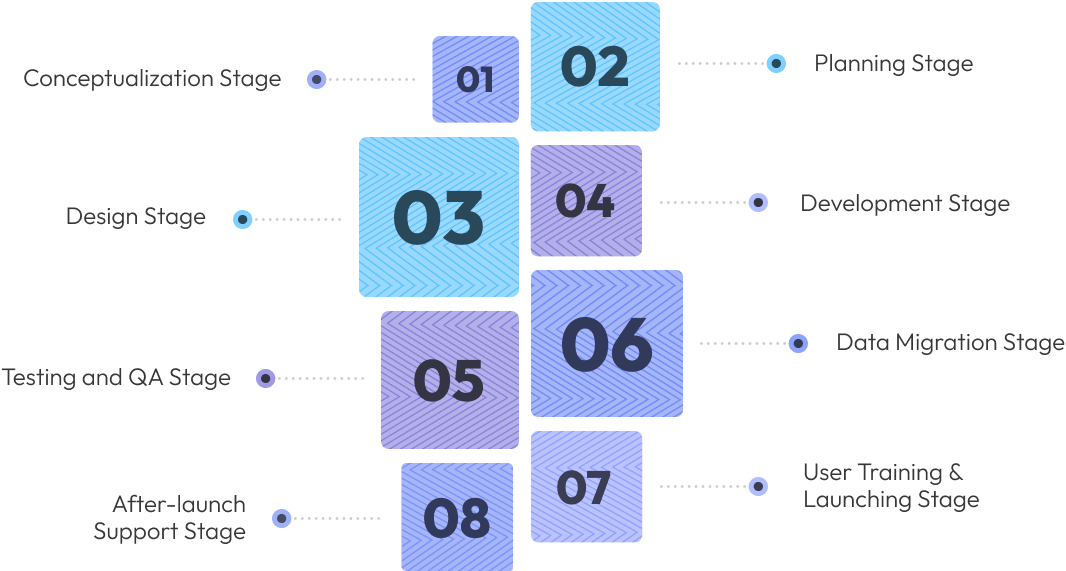CMS Development
We deliver customized solutions to meet the needs of the changing market
We deliver customized solutions to meet the needs of the changing market
Genx Integrated Systems offers Content Management System Development Services, using platforms like WordPress, Joomla, and Drupal. With a track record in custom-built CMS solutions, we’re not just another development company. We’re your strategic partner. We assist you with tailored solutions, ensuring compatibility with databases like MySQL and PostgreSQL. Our team ensures that the CMS is user-friendly, scalable, and SEO-optimized.
Genx Integrated Systems, experienced in platforms such as WordPress, Joomla, and Magento, provides its genuine commitment to quality CMS Development. Our custom Content Management System Development services are collaborative and built on real experience. We provide custom CMS development services like SEO optimization, plugin integration, theme customization, and data migration along with user training and support. Genx has a dependable team of CMS professionals for your requirements.
Choosing the right Content Management System is an important decision. It can significantly impact your digital presence. A Content Management System should not only be about managing content. A CMS should integrate tools like Elementor for enriched user experience, plugins like Wordfence for robust security, and frameworks that support scalability, such as PHP frameworks. We especially consider them in our CMS Development process.
At the heart of any Content Management System is its ability to easily create, edit, and organize pages. This foundational feature ensures that managing content remains straightforward for all users.
Every business has its own needs, and the Content Management System should reflect that. Whether you're interested in e-commerce, adding a CRM, or aiming for personalization, your CMS should align with your business's goals and future plans.
As your team grows, your Content Management System should support varied roles and permissions. It's not about access; it's about having a clear content approval process. This keeps track of changes and ensures content safety.
In the expansive digital world, ensure your content doesn't get lost. A Content Management System that focuses on SEO ensures your content reaches its target audience.
CMS should work well with other systems. It must integrate with backend systems like CRM, marketing tools, and e-commerce platforms. It ensures a cohesive digital experience.
Complexity shouldn't hinder capability. A Content Management System with an efficient interface ensures that everyone can manage content with ease.
Today's audience values personal touches. Your Content Management System should be capable of delivering customized content. The content must connect with individual behaviors and preferences.
When choosing a Content Management System, consider both the price and the features offered. Think of it as a long-term commitment.
Different businesses have different needs. Content Management System must be flexible for cloud hosting, managed services, or in-house solutions.
The core of content creation lies in the editor. It should support creativity. Content Management System must offer design options, and promote efficiency.

Databases store the content, user data, and other essential information. It allows the CMS to retrieve and display it dynamically on the website.
Modern CMS platforms are designed to be mobile-friendly. They use responsive design techniques to ensure content displays correctly across various devices.
Yes, most platforms support CMS API integrations. It allows you to connect with external tools and services effectively.
Plugins and extensions are add-ons that enhance the functionality of a CMS. It offers features like SEO tools, security enhancements, and e-commerce capabilities.
CMS platforms often come with built-in security measures. This includes CMS security and maintenance features like data encryption and offers backup solutions to prevent data loss.
Caching improves website speed by storing a version of the site to serve users. This reduces the need to fetch data from the database continually.
Many CMS platforms offer SEO-friendly features, including meta tags and URL structuring. CMS integrates with SEO plugins to optimize content for search engines.
Templates and themes determine the visual layout and design of a CMS-powered website. This allows for CMS theme customization and branding.
Content versioning allows users to track changes and revert to previous versions. This maintains a history of content updates within the CMS.
A headless CMS development focuses on the backend content management. This allows developers to use any frontend tool to display the content. Thus, offering more flexibility in design and development.
Custom CMS Development Services provide a personalized CMS tailored to your unique business needs, allowing for greater flexibility, scalability, and a user-friendly interface that aligns with your content strategy and workflow requirements.
Content Management System Development involves creating a bespoke CMS solution that is specifically designed to address your business’s unique challenges and goals, offering more customization options and integrations compared to standard, out-of-the-box CMS platforms.
© 2024 Genx All Rights Reserved